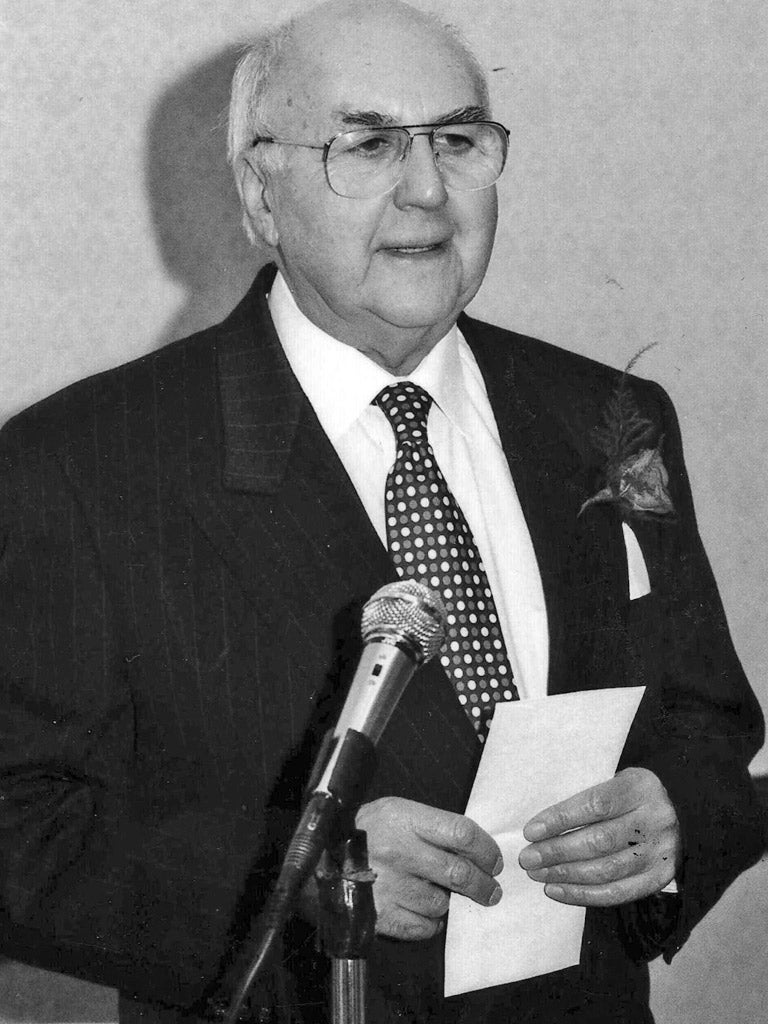Ronald Wolfe: Writer and producer best known for 'The Rag Trade' and 'On The Buses'

The industrious comedy writer and producer Ronald Wolfe, who has died aged 89 following a fall, was best known for his successful sitcoms The Rag Trade and On The Buses. Despite the very British flavour of his work, some of it would achieve international success. In later life, he happily settled into the role of an elder statesman of showbusiness, keen to impart his knowledge of the industry to others.
A Jewish Londoner of Russianextraction, Wolfe began his working life as a radio engineer. He was briefly a stand-up comedian himself, recalling that "I came from vaudeville and music halls". His writing partner throughout his career, Ronald Chesney, whom he always referred to as "Ches", then had an act playing Ravel's Bolero on the harmonica. Wolfe said of their writing methods, "Ches has the better concentration and is the better editor, so he's the 'putter-downer' while I'm the 'walker-rounder'."
Among his earliest writing credits was Starlight Hour (1951), a series on BBC Radio's Light Programme with Beryl Reid among its regulars. He became Reid's scriptwriter, initially for her schoolgirl character Monica; when she was added to the cast of Educating Archie, its creator and writer Eric Sykes agreed to Wolfe's joining its writing team. Wolfe was represented by Kavanagh Productions, whose other clients included Sykes, Spike Milligan, Frank Muir and Denis Norden.
For television, Muir and Norden, then the BBC's comedy advisers, picked up The Rag Trade, which ran from1961-63. Miriam Karlin was well cast as the strident shop steward Paddy (and briefly made "Everybody out!" into a catchphrase), while Peter Jones played the factory boss Fenner, employing the same Cockney-Jewish intonations he had used in his radio work with Peter Ustinov. The strength of the femaleensemble playing the workforce, who included Sheila Hancock, Barbara Windsor and the timorous, bird-like Esma Cannon, was attributed tothe show's being taped on Sundays, when they were free from their West End commitments.
The series achieved ratings of over 11 million, and a West End version opened at the Piccadilly in December 1962. It had a certain critical standing, due to its strong female roles and hitherto unexplored mining of industrial relations, that Wolfe and Chesney's later work would not achieve.
The Bed-Sit Girl (BBC, 1965-66) was a Wolfe and Chesney vehicle for Sheila Hancock, then struggling with a "dizzy blonde" image, which she would successfully discard. The supporting cast included Derek Nimmo, for whom they then wrote Sorry I'm Single (BBC, 1967), casting him as a bashful "eternal student". Wild, Wild Women (BBC, 1969) had superficial similarities with The Rag Trade, with Barbara Windsor heading the workforce in a milliners' sweatshop, except that it was set in the 1900s.
On The Buses having been turned down by the BBC, Muir, then Head of Comedy at London Weekend, commissioned it for LWT , later terming it "rather at the baked beans end of my menu". Running from 1969-73, at the time it was more successful in the ratings than Dad's Army; there can be no argument over which of the two has proved more durable in re-runs, however.
As more than one surprised scholar of British film has recorded, the 1971 film version (curiously, a Hammerproduction) was the biggest domestically produced film at the British box office that year, outgrossing the James Bond film Diamonds Are Forever. Wolfe and Chesney were its co-producersas well as co-writers, duties they reprised for Mutiny On The Buses (1972) andHoliday On The Buses (1973). Jonathan Lynn noted in his recent book Comedy Rules that Wolfe and Chesney then seemed to be moving towards American-style positions as creator-producers, hence drafting in other writers for the TV series, while they concentrated on the films.
Returning to sitcoms, Romany Jones (LWT, 1973-75) and Yus My Dear (LWT, 1976) both centred on Arthur Mullard. A revival of The Rag Trade (LWT, 1977-78), with Karlin and Jones returning, did not match the original's impact. Neither Watch This Space (BBC, 1980), set in the advertising industry, nor Take A Letter, Mr Jones (Southern, 1981), a vehicle for John Inman, achieved their earlier projects' success.
In 1986, Wolfe began tutoring on comedy writing at City University in London, continuing to do so in 1988, and at Central St Martins College of Art and Design in 2004. He published Writing Comedy in 1992 (revised edition 2003).
Regularly attending international television festivals, he had a stage sequel to On The Buses produced in Canada in 1987, although plans for Back On The Buses in the early 1990s, a further sitcom in which the original characters would have owned their own fleet of buses, did not happen. An idea to revive his sitcom for Thora Hird and Freddie Frinton, Meet The Wife (BBC, 1963-66) for Les Dawson was scuppered by Dawson's death; similarly, Kangaroo Alley, a BBC sitcom about Australian expatriates, remained earthbound.
To his own surprise, Fredrikssons Fabrikk, a translated version of The Rag Trade, proved highly popular in Norway and Sweden in the early '90's. He was a genial presence at screenings and debates on television comedy at the National Film Theatre.
Gavin Gaughan
Harvey Ronald Wolfe-Luberoff, writer and producer: born Stoke Newington, London 8 August 1922; married 1953 Rose Kreiger (two daughters); died Surrey 18 December 2011.
Join our commenting forum
Join thought-provoking conversations, follow other Independent readers and see their replies
Comments
Bookmark popover
Removed from bookmarks